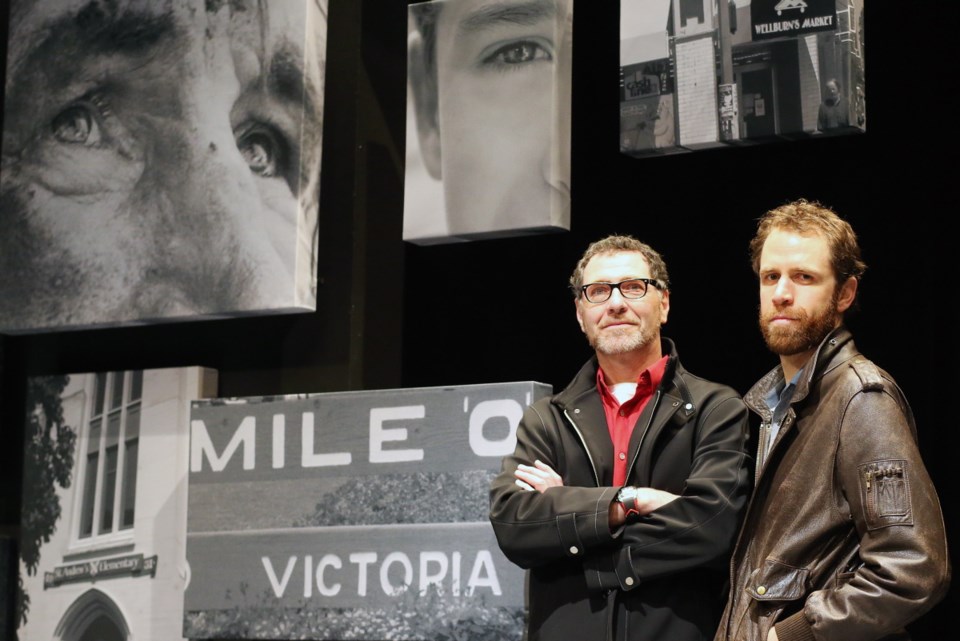What: Home is a Beautiful Word
Where: Belfry Theatre
When: Open 8 p.m. tonight, continues to Jan. 19
Tickets: $25 (250-385-6815)or pay what you can
With Home is a Beautiful Word, Victoria playwright Joel Bernbaum and the Belfry Theatre may well make theatre history.
As far as director Michael Shamata knows, this is Canada’s first verbatim theatre play about the homeless. Verbatim theatre scripts such as Home is a Beautiful Word are created using words uttered by real people.
Shamata, the Belfry’s artistic director, commissioned the unconventional play. Bernbaum conducted more than 500 interviews, many of them with Victoria’s homeless population. This produced some 3,000 pages of transcripts which provided the raw materials for the play.
In an effort to allow access to the show to this city’s disadvantaged, the Belfry Theatre will offer 50 “pay-what-you-can” tickets for each performance. The company will also distribute 20 free tickets per show, as well as give organizations working with the homeless a 20 per cent discount on tickets.
This, too, may be a first.
“I’ve never heard of any theatre doing this, ever, across the country, or even in the world,” Bernbaum said.
During performances of Home is a Beautiful Word, there will be an area at the Belfry for street people to deposit their carts, backpacks and even their pets. The theatre company has put up posters at shelters so the homeless will know they have free admission.
The two-hour play, having its première tonight, is described as variously moving, enlightening and funny. There are four actors — Yoshié Bancroft, Kelt Eccleston, Kayvon Kelly and Kevin Loring — playing a staggering 58 roles.
The characters are not only the homeless; many “housed” Victorians were interviewed about the subject. Over two years, Bernbaum spoke with street people, lawyers, doctors, police officers and teachers. He chatted with children, teens and seniors. He haunted schools, malls, homeless shelters, churches and jails.
Bernbaum knocked on doors, making cold calls to solicit material. Often, people dismissed him as just another salesman or evangelist. For this reason (he says he could withstand only so much rejection), the playwright would venture out for only an hour at time. Nonetheless, no matter what the neighbourhood, there would always be at least two people who allowed a stranger into their living rooms.
“That’s extraordinary,” Bernbaum said.
Interviews ranged from five-minute encounters to multi-hour conversations conducted with the same people over months. To avoid a static play consisting solely of monologues, Bernbaum devised a novel way of creating dialogue. At the end of his interviews, he’d ask his subject — a judge, let’s say — to ask a question of someone else, for example, a homeless person. The playwright would then pass this question along. And after it was answered, he’d allow the homeless person (in this case) to ask a question in return. This created a back-and-forth between people who might not otherwise interact.
“It takes a lot of time,” Bernbaum said. “But, boy, is it ever worth it. Because you have citizens in the same city that walk by each other in the day, but never meet except on the Belfry stage.”
Like many cities, Victoria has long grappled with the dilemma of how to deal with street people. Shamata, well aware of the problem, was keen to have the Belfry address it.
The company had previously hosted a verbatim play, The Middle Place, about young people living in homeless shelters. Bernbaum seemed the ideal person to create a new play on Victoria’s homeless. The young actor/playwright wrote his master’s thesis on verbatim theatre’s relationship to journalism at Carelton University in Ottawa.
The process of creating the play started in 2011. There were multiple workshops over three years. There was also a reading of the play at Our Place, the street outreach on Pandora Avenue. Although well received, it was “very emotional,” Bernbaum said. Afterward, a woman in the audience — which included interview subjects — thanked him for writing the play.
“I just lost my train of thought and almost cried,” he said.
Shamata and Bernbaum wanted the people interviewed for Home is a Beautiful Word to have their say. The team deliberately tried to avoid foisting their own opinions.
“The challenge has been — as Joel says, the ‘ethic’ of it — to put it on stage and be true to these people and not impose anything,” Shamata said. “We just want to present it and let audiences see it how they will.”
The pair hopes the play will persuade theatregoers to view homelessness with a new perspective. Shamata says the process of creating Home is a Beautiful Word has made him more receptive to the possibility of connecting with those who live on the streets of our city.
“There’s a speech where this [homeless] guy says, ‘Just say hi,’ ” Shamata said. “And I do now.”
